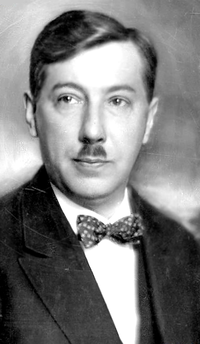
undefined
undefined
Prominent Poles
Eugeniusz Kwiatkowski politician and economist, Deputy Prime Minister of Poland, government minister and creator of Gdynia seaport and of the Central Industrial Region.

Born: December 30, 1888, Krakow (Austro-Hungarian partition of Poland)
Died: August 22, 1974, Krakow, Poland
Early days. His father, a lawyer, was employed by the Krakow Railway. After inheriting his brother’s estate he moved with his family (Eugeniusz had three siblings) to Czernichowce. In 1898 Eugeniusz started studying at The Franz Joseph High Shool in Lwow with not much success. Since 1902 he went to the famous Jesuit school (Zakład Naukowo-Wychowawczy Ojców Jezuitów w Chyrowie). After graduating in 1907 he studied Chemistry till 1910 at the Lwow Polytechnic, became active in the fighting for independence underground organizations Zet and Zarzewie and became a member of Polskie Drużyny Strzeleckie. In 1910 his mother- afraid of his political activity- asked him to continue further studies at the Ludwig Maximilian University of Munich. He went there and graduated in 1912.
Career. In 1913 he returned to Lwow and practiced in Gazownia Miejska. During WWI he fought in the Wschodni Legion then in Polish Legions and did underground work In Polska Organizacja Wojskowa. During the Polish-Bolshewik war he worked in the Central Office of Army Supplies (chemical section) at the Office of Military Affairs. In 1919 he became an official in the Department of Public Works. In 1921 he published an important paper “Coal as a technical raw material”. His publications and his initiatives were noticed by future President, a chemist and an invenstor, Ignacy Moscicki. In 1923 when Moscicki became a general director of State Factory On Nitrogen Compounds in Krolewska Huta (presently Chorzow)oscicki nominated Kwiatkowski to be his deputy for technical affairs.
After Józef Piłsudski's May coup d'état of 1926, he was recommended by president of Poland Ignacy Mościcki for the post of Minister of Industry and Trade in the government of Kazimierz Bartel. E. Kwiatkowski was a minister in eight successive governments (1926–30) and Deputy Prime Minister of Poland and Minister of Treasure in two governments (1935–39). Among the most famous achievements of Kwiatkowski are the giant construction projects: the construction of Gdynia seaport, the development of the Polish Merchant Navy and sea trade, and the creation of Centralny Okręg Przemysłowy (The Central Industrial Region). Kwiatkowski understood very well that the future of Polish economy requires having its own seaport. And so a small fishermen village, Gdynia, was transformed during 1921-1930 into a seaport. In 1930 a regular passenger line Gdynia-New York-Gdynia was opened. Kwiatkowski forwarded an inintensive industrialization program. In 1930 the state owned Warszawskie Państwowe Zakłady Inżynierii bought the company Ursus where one started to manufature tanks, motrocycles and and airplane engines.. In Krolewska Huta (Chorzow) one started to manufacture ammonia and in Moscice near Tarnow a chemical factory was built. The construction spree was interrupted in 1929 by the great crisis and by increasing Pilsudski’s mistrust versus Kwiatkowski. On the other hand Kwiatkowski didn’t like the arresting of the leaders of the opposition and the Brzesc process. However thanks to Moscicki he became the director of the Panstwowa Fabryka Zwiazkow Azotowych in Moscice. After Pilsudki’s death in 1935 Kwiatkowski became Vicepremier and as such he inreased the state’s epenses for building new factories. In 1937 an armaments factory was built in Rozwadow later called Huta Stalowa Wola and one began to built a nearby city named Stalowa Wola. First cannons were produced in 1938. Dams and hydroelectric power plants were built in Roznow and Myszkowice. An engine factory was built in Rzeszow, an airplane factory – in Mielec, in Krasnik- a factory of mortar missiles, factories of munition in Lubartow and Debie and a factory of synthetic rubber in Debica. After the Soviet Union on 17 September 1939 joined Nazi Germany in the invasion of Poland, he fled Poland with the rest of the Government. He was interned in Romania until 1945. Immediately after the war he got an invitation to return to Poland from Poland’s communist president, Boleslaw Bierut. At that time the communists tried to invite from abroad known Poles to authenticate their rule. In 1945 kwiatkowski became the chef of the Office of the Seacoast Affairs. In the years 1947–1952, he was a deputy to the Polish parliament (Sejm). With the strengthening of the communist and Soviet grip on the Polish government, which he opposed and refusing joining the ruling communist party, PPR, he fell out of favor of the communist government of Poland and was forced to retire in 1948. From 1952 onward, he concentrated on studies of chemistry, physics, and history.
Personal. In 1913 he married Leokadia Glazer. They had three children.
Awards. 1974 Doctor Honoris Causa of Gdansk University for contributon to the development of Polish maritime economy and general economy theory.
Based on an article that appears in Wikipedia
Wikipedia
Text is available under the Creative Commons Attribution-ShareAlike License; additional terms may apply.
Other sources:
Wikipedia in Polish
Publlshed on 9/3/15
Return to home page:
Prominent Poles
